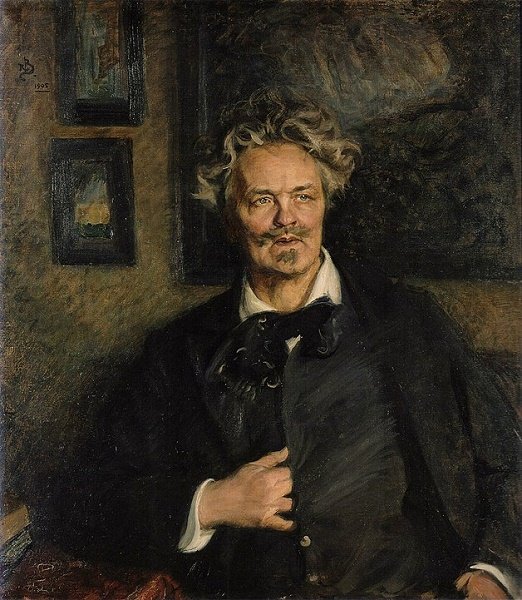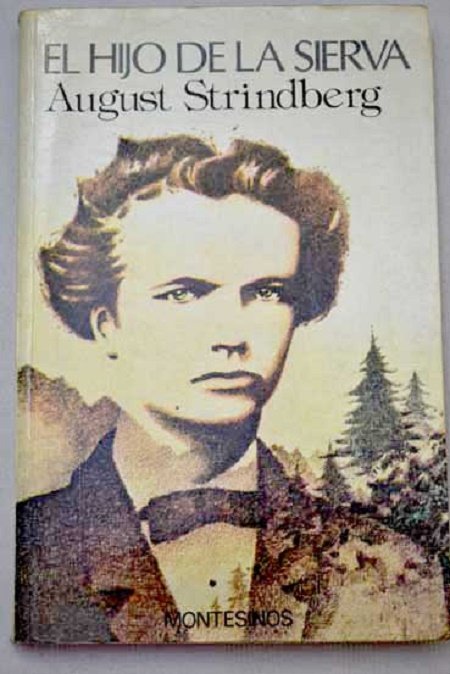Dramaturgo y novelista sueco, August Strindberg, nació el 22 de enero de 1849 en Estocolmo. Se le considera uno de los renovadores del teatro, precursor, en cierta medida, de las tendencias del teatro del siglo XX conocidos como teatro de la crueldad y teatro del absurdo. También escribió cuentos, ensayos y textos autobiográficos. Su vida estuvo marcada por constantes crisis psicológicas, habiéndose considerado que sufría del trastorno esquizofrénico.
Entre sus dramas destacan El padre (1887), La señorita Julia (1888), La danza de la muerte (1900), El sueño (1901), Sonata de los espectros (1907), El pelícano (1907). Algunas de sus obras dramáticas fueron llevadas al cine, como es el caso de La señorita Julia, con dos reconocidas versiones cinematográficas; una realizada por el cineasta británico Mike Figgis en 1999 y la otra dirigida por la actriz y cineasta sueca Liv Ullmann en 2014.
En sus novelas ha destacado el carácter autobiográfico; entre ellas tenemos El hijo de la sierva (1886), Alegato de un loco (1887), Solo (1903). También resalta su texto Inferno (1898), considerado una autobiografía.

Tanto sus dramas como sus novelas giran en torno a asuntos recurrentes en su visión y experiencia: la infancia, la familia, el matrimonio, la mujer, las clases sociales, tratados desde una concepción muy crítica, muchas veces demoledora y dolorosa, donde acentúa su rechazo a la hipocresía, a la imposición, a la moral de su época.
En particular, me detendré en su novela autobiográfica El hijo de la sierva, que escribe alrededor de sus 40 años, en la que aborda el período de su infancia y adolescencia. El título es una alusión irónica a sí mismo, jugando con la referencia bíblica: Ismael, hijo de Agar, la sierva con quien Abraham tiene su primer hijo, no pudiéndolo hacer con su esposa Sara. Y efectivamente, Strindberg fue hijo de una criada, amante de su padre, el comerciante Carl Oscar Strindberg.
Al ser autobiográfica, la novela narra, desde una tercera persona, esos años de la vida de Johan (primer nombre de Strindberg), donde lo experimentado se va intercalando con reflexiones de gran interés y agudo pensamiento. En algunas de ellas me he detenido para compartirlas con ustedes.

Actualmente se habla tanto de la verdad y de decir la verdad, ¡como si fuera algo tan difícil que mereciera elogios! Alabanzas aparte, no es tan fácil establecer cómo son las cosas en realidad y decir la verdad no significa nada especial. Una persona no es siempre lo que tiene fama de ser. Más aún, toda opinión puede ser errónea; detrás de cada pensamiento merodea una pasión, cada juicio se tiñe de un matiz. Pero el arte de distinguir el tono exacto del estado de cosas es infinitamente difícil. Por ello seis periodistas han podido ver al mismo tiempo de seis colores diferentes el manto de coronación del emperador. Los pensamientos nuevos no son aceptados de buena gana por nuestros cerebros automatizados: las personas de edad no tienen más confianza que en sí mismas e, ignorantes, se imaginan que pueden fiarse enteramente de sus propios ojos, sin saber que pululan los errores de óptica.
(…) el primer deber del individuo, su deber más sagrado, es el de protegerse a sí mismo tanto como le sea posible sin perjudicar a otro.
La sociedad honra con el nombre de caracteres a quienes han buscado y encontrado su sitio, a quienes han jugado un papel, a quienes han llegado a descubrir ciertas reglas de conducta que terminan por asimilarlas automáticamente a sus acciones.
El carácter, así definido, se convierte en un mecanismo demasiado simple; el hombre de carácter no posee más que un único punto de vista para las situaciones extremadamente complejas de la vida. Está decidido a tener durante toda su vida una sola y única manera de ver los hechos y, para no sentirse culpable de estar falto de
personalidad, nunca cambiará de opinión, por necia, por absurda que sea. Un personaje deberá ser, por tanto, un hombre demasiado común y un poco tonto. Hombre de carácter y autómata son casi sinónimos. Los famosos caracteres de Dickens no son más que marionetas y los del teatro están condenados a ser unos autómatas. Además, un personaje sabrá siempre lo que desea. Pero ¿qué se sabe acerca de lo que se quiere? Se quiere o no se quiere, no hay más alternativa. Si tratamos de reflexionar sobre lo que se quiere, veremos que la mayoría de las veces no interviene la voluntad. De la única manera que la reflexión tendría sentido sería si, en la vida y en la sociedad, pensáramos siempre en las consecuencias que nuestros actos tendrán para los demás y para nosotros mismos, pues quien actúa impulsivamente es un insensato y un egoísta, un ingenuo, un inconsciente; no obstante, son éstos los que se abren camino en la vida, ya que no tienen en cuenta los inconvenientes que sus acciones pueden traer a los demás, sólo les importan las ganancias que pueden obtener.
El yo no es algo absoluto, es una multiplicidad de reflejos, una complejidad de instintos, de deseos reprimidos o
desatados.
¡Y fue así como entonces se lanzó a la vida! Para madurar y, a pesar de todo, permanecer siempre fiel a sí mismo.
Referencias:
Strindberg, August (1981). El hijo de la sierva. España: Montesinos Editor.
https://es.wikipedia.org/wiki/August_Strindberg
https://ww3.lectulandia.com/book/el-hijo-de-la-sierva/






Click here to read in english
August Strindberg: Thoughts from “The Servant’s Son”
Swedish playwright and novelist, August Strindberg, was born on January 22, 1849 in Stockholm. He is considered one of the innovators of theater, a precursor, to a certain extent, of the 20th century theater trends known as theater of cruelty and theater of the absurd. He also wrote stories, essays and autobiographical texts. His life was marked by constant psychological crises, and he was considered to suffer from schizophrenic disorder.
His most notable plays include The Father (1887), Miss Julia (1888), The Dance of Death (1900), The Dream (1901), Sonata of the Ghosts (1907), and The Pelican (1907). Some of his dramatic works were adapted for the big screen, such as Miss Julia, which has two well-known film versions; one made by British filmmaker Mike Figgis in 1999 and the other directed by Swedish actress and filmmaker Liv Ullmann in 2014.
His novels are characterized by their autobiographical nature; among them we have The Servant's Son (1886), Plea of a Madman (1887), and Alone (1903). His text Inferno (1898), considered an autobiography, also stands out.
Both his dramas and his novels revolve around recurring themes in his vision and experience: childhood, family, marriage, women, social classes, treaties of a very critical conception, often devastating and painful, where he emphasizes his rejection of hypocrisy, imposition, and the morality of his time.
In particular, I will focus on his autobiographical novel The Son of the Servant, which he wrote around the age of 40, in which he addresses the period of his childhood and adolescence. The title is an ironic allusion to himself, playing with the biblical reference: Ishmael, son of Hagar, the servant with whom Abraham has his first son, not being able to do so with his wife Sarah. And indeed, Strindberg was the son of a servant, the lover of his father, the merchant Carl Oscar Strindberg.
Being autobiographical, the novel narrates, from a third person, those years of Johan's life (Strindberg's first name), where what he experienced is interspersed with reflections of great interest and sharp thought. I have paused to share some of them with you.
Nowadays there is so much talk about truth and telling the truth, as if it were something so difficult that it deserved praise! Praise aside, it is not so easy to establish how things really are and telling the truth does not mean anything special. A person is not always what he is reputed to be. Moreover, every opinion can be wrong; behind every thought lurks a passion, every judgment is tinged with a nuance. But the art of distinguishing the exact tone of the state of things is infinitely difficult. That is why six journalists have been able to see the emperor's coronation mantle in six different colors at the same time. New thoughts are not readily accepted by our automated brains: older people have no confidence except in themselves and, ignorant, imagine that they can rely entirely on their own eyes, not knowing that optical errors abound.
...
(…) the first duty of the individual, his most sacred duty, is to protect himself as much as possible without harming another.
...
Society honours with the name of character those who have sought and found their place, those who have played a role, those who have managed to discover certain rules of conduct which they end up assimilating automatically to their actions.
Character, defined in this way, becomes too simple a mechanism; the man of character has only one point of view for the extremely complex situations of life. He is determined to have one and only one way of seeing the facts throughout his life and, in order not to feel guilty for lacking personality, he will never change his opinion, however foolish or absurd it may be. A character must therefore be a very ordinary man and a little stupid. Man of character and automaton are almost synonymous. Dickens' famous characters are nothing more than puppets and those of the theatre are condemned to be automatons. Moreover, a character will always know what he wants. But what do we know about what we want? We want or we don't want, there is no other alternative. If we try to reflect on what we want, we will see that most of the time the will does not intervene. The only way that reflection would make sense would be if, in life and in society, we always thought about the consequences that our actions will have for others and for ourselves, because those who act impulsively are foolish and selfish, naive, unconscious; nevertheless, they are the ones who make their way in life, because they do not take into account the inconveniences that their actions can bring to others, they only care about the gains they can obtain.
...
The self is not something absolute, it is a multiplicity of reflexes, a complexity of instincts, of repressed or unleashed desires.
...
And that is how it then launched itself into life! To mature and, despite everything, always remain true to itself.